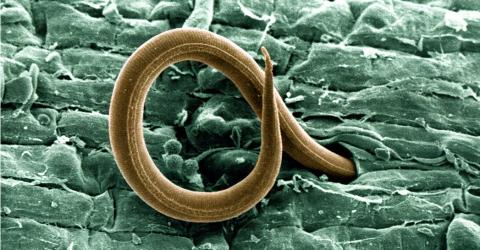Every month, we highlight an outstanding example of UNH intellectual property with excellent commercial potential. Contact unh.innovation@unh.edu for more information about any of UNH's innovations.

Using PDE Inhibitors to Combat Nematode Infestation
An inexpensive, scalable, and environmentally sound process of using PDE inhibitor compounds as nematicides.
Download the Innovation Brief
Benefits:
- Screening assays For determining efficacy of new PDE inhibitor-based nematicide compounds
- Greatly reduced environmental impact By developing new PDE inhibitor compounds selective for nematode PDEs, this method will avoid adverse effects on agrichemical and farm workers, vertebrate animals, and crops.
Applications:
- Crop management
- Nematicide candidate compound screening
Intellectual Property Status:
- US 14/776,827, PCT/US2014/029910
Overview
Nematodes are the world’s most destructive plant pathogen. Responsible for an estimated $100 billion dollars of crop damage annually, soil-dwelling plant parasitic nematodes target the roots of most crops and represent a significant challenge to attaining yields high enough to meet growing demand. Traditional methods of managing parasitic nematodes are either of limited efficacy, environmentally dangerous, or toxic to humans, birds, fish, and other non-target organisms. As a result, the Environmental Protection Agency has banned the use of many such agents, creating the distinct need for a next generation of nematicides.
Researchers at the University of New Hampshire are investigating the use of phosphodiesterase (PDE) inhibitors as nematicides. These compounds may allow for rational nematicide design to enhance selectivity and eliminate adverse environmental effects. Our researchers have developed assays to evaluate the effects of this class of compounds on various aspects of the nematode lifecycle. UNH’s patent-pending method can be used to identify next-generation targeted nematicides to mitigate the economic, environmental, and social liabilities associated with traditional pesticides.
Lead Innovator, Rick Cote, Ph.D.
Professor Cote’s research interests include the structure, function, regulation, pharmacology, and molecular evolution of the phosphodiesterase enzyme superfamily. In addition to investigating the pharmacology of nematode PDEs and applications to parasitic nematode control, he is a leading expert on the role of PDEs in the visual signaling pathway of rod and cone photoreceptor cells of the retina.
Archive
-
2021
- September 2021
Betty and Barney Hill Collection
- MARCH 2021
Innovations in Aqueous Electrochemical Energy Storage Devices
-
2020
- MARCH 2020Viscoelastic Liquid Drop Generator
- February 2020IOL INTACT® Protocol Testing Software
- JANUARY 2020SIMAP®
-
2019
- AUGUST 2019
- JULY 2019
- JUNE 2019
- APRIL 2019
- MARCH 2019
- JANUARY 2019
-
2018
- DECEMBER 2018
- OCTOBER 2018
- SEPTEMBER 2018
- JULY 2018
- JUNE 2018
